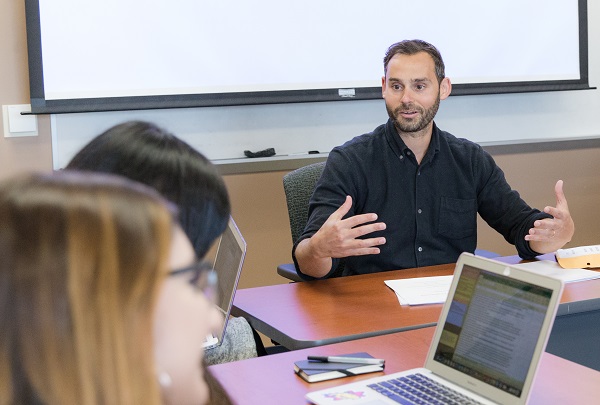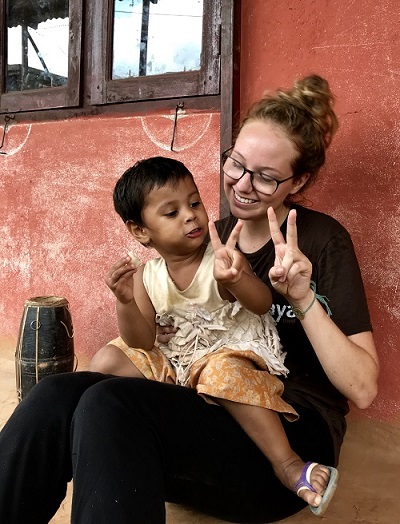
If you want others to be happy, practice compassion.
If you want to be happy, practice compassion.
— Dalai Lama
By Mimi Ko Cruz
When all the world’s religions endorse practicing compassion, and even Charles Darwin, the father of the theory of evolution, argued that communities that practice compassion would be the most successful, then maybe there’s something to it, Paul K. Piff explains in his introductory lecture for the online “science and practice of compassion” course.

“Compassion is central to our ability to survive and thrive,” says Piff, assistant professor of psychological science. “Most of the problems we are facing as a species, as a nation or as individuals rest on our ability to extend our understanding, our perspectives and our kindness beyond ourselves to other people.”
Piff defines compassion as a feeling of concern and interest that you experience when you want to elevate the well-being of others. It’s rooted in the awareness that someone else is suffering or in need. His online class takes a deep dive into compassion, how it motivates people to want to help others in distress and how it can be cultivated to help solve some of the world’s most pressing problems, such as poverty, social injustice and environmental degradation.
The 10-week course, which debuted online in winter 2018, delves into the origins of compassion, how researchers study it, what its effects are and why it matters. Besides live webinars with Piff, the class features guest lectures from other experts on the subject, including: School of Social Ecology Dean Nancy Guerra; Richard Matthew, director of the UCI Blum Center for Poverty Alleviation; UC Berkeley’s Dacher Keltner, Emiliana Simon-Thomas and Rodolfo Mendoza-Denton; UC Davis’ Philippe Goldin; UC San Francisco’s Elissa Epel and Eve Ekman; Northeastern University’s David DeSteno; and Yale’s Paul Bloom.
The class, taken by 200 students from various UC campuses this year, is the first part of UCI’s School of Social Ecology, the Blum Center for Poverty Alleviation and the Living Peace Foundation’s Global Service Scholars program, which launched in 2017.
The program offers students an opportunity to practice compassion as volunteers across the world. In its first year, 19 students were chosen to be Global Service Scholars. The students spent four weeks learning and serving as volunteers at a women’s prison in Peru, at health clinics and schools in Ghana and at an elephant rehabilitation camp in Thailand.

This summer, 27 Global Service Scholars — who are required to take Piff’s online course and an intensive compassion and altruism seminar taught by Guerra — served at an entrepreneurial school in Paraguay, a woman-owned farm in Nepal and at South African youth-serving agencies, health clinics, environmental conservation and women’s empowerment projects. Most of their travel and lodging expenses and program fees are covered by support from the Living Peace Foundation.
The Global Service Scholars program makes up one part of the Blum Center’s Compassion Action Project, which “enables us to promote compassion within the university and become a global resource for programs and policies to build a more compassionate world,” Matthew says.
Another part of the project is Small Change, Better World, which provides seed grants of up to $3,000 to students who want to create and implement small projects that address specific needs in their own communities or in places they’ve visited worldwide.
Matthew reports that Small Change, Better World has funded 12 projects, for a total of about $16,000, so far. Some of the projects include a library in Nepal, school supplies for impoverished children in Peru, solar panels on a hospital in Uganda and hygiene kits for homeless people in Orange County.
“We’re trying to find creative ways to give our students more opportunities for experiential, service learning. Through the online course, the seminar, Global Service Scholars and Small Change, Better World, they will get a sense of what it’s like to live in somebody else’s shoes and solve problems from that perspective,” Matthew says.
Kimberly Haagenson, who was a Global Service Scholar at a soup kitchen and at an orphanage in Peru and a recipient of a Small Change, Better World grant, says the experience indeed had that effect on her.
It “definitely changed me in a lot of positive ways,” she says, adding that in Guerra’s seminar, she learned “to interrogate my motives and to accept and deal with my honest feelings in order to do my best work for the community.”
She says she also learned about effective altruism, which prompted her to constantly ask herself: “how can I do better?” and “how can I give more?”
Haagenson, who graduated in 2018 and now works as an assistant teacher at an early childhood education center in Oceanside, calls the Global Service Scholars program enriching and rewarding.
“I believe this program makes the world a better place,” she says. “Anytime someone steps into a community and culture different than their own, there is an immense potential for compassion and understanding, and this program creates that potential for UCI students.”
But, at a certain point, social and economic inequality can become volatile, Matthew says. “People are asking: ‘why do millions of Americans not have healthcare? Why is our middle class the only middle class in the world with an average of $36,000 of student debt per millennial?’ We’re creating a very volatile society of haves and have nots. That’s deeply problematic. What a university can do is collect trustworthy research, develop problem-solving technologies and policies and educate the next generation. These are the goals of the Compassion Action Project.”
The next step is to grow the project by opening Piff’s online course to more students and serving as a model for other universities to replicate and expand.
In addition, the project plans to launch a Compassion University program, offering a series of online workshops, trainings and courses, contributing to the research base on compassion and providing a consultation service to local agencies and community groups on strategies for building a culture of compassion.
The project also is creating a Children’s Compassion Network that is partnering with the UNICEF Office of Research on Child Rights and Protection. The purpose is to bring together leaders from around the world to find ways to improve the lives of children who are marginalized, abused and neglected.
A Compassionate Capitalism initiative that would offer online and in-person workshops for businesses to increase compassion in the workplace also is in the works.
It all comes down to understanding and spreading the science and practice of compassion to make the world a better place, Matthew, Piff and Guerra agree.
“If your problem is how to be happier as a person, the science of compassion will help” Piff emphasizes. “If your problem is how to make your community happier, more organized, more driven, more cooperative, more collective, the science of compassion will help. If you want to understand how to navigate climate change, the science of compassion will help. Inequality, global hunger, homelessness, all of these problems, rest, in part, on understanding how compassion works.”
And, compassion is the foundation of social justice, Guerra affirms.
“People are all connected, and the compassion initiative is really a bigger way of thinking about social relationships,” she says. “Being compassionate is a call to action to build a better world — a world with less inequality, greater access to resources, more kindness and healthier human relationships.”
Compassion University Coming in 2020
Plans are underway to offer a day filled with opportunities to learn more about the science and practice of compassion from worldwide leaders. For details, join the mailing list at socialecology.uci.edu/compassion2020.